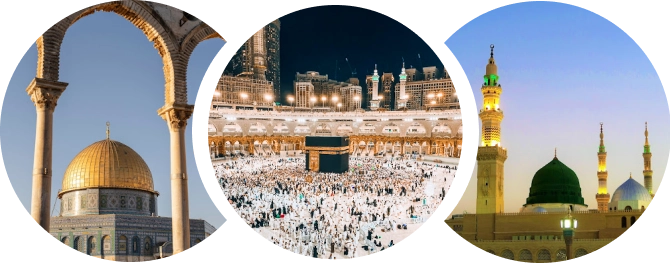Maghrib Prayer’s Importance and Remarkable Benefits
Praying five times a day can be overwhelming at times, but not when you are aware of the profound benefits it has on your spiritual and physical life.
The Maghrib prayer, one of Islam’s five compulsory prayers, has enormous benefits that many Muslims are unaware of.
This article will explore the mystical dimensions of Maghrib Prayer, shedding light on its numerous effects ranging from enhancing faith to fostering personal growth while firmly grounding you in your connection with Allah SWT.
So, let us dive together into these divine depths!
Understanding the Maghrib Prayer
The Maghrib prayer, also known as the evening prayer, is performed after sunset and has great significance in Islam.
Origin and Meaning
The Maghrib prayer is unique among the five daily prayers prescribed by Islam; the word ‘Maghrib’ directly translates to ‘sunset’ in Arabic.
This Salat is important because it is traditionally observed immediately after sunset, symbolizing gratitude for the day’s blessings and providing an opportunity for spiritual reflection during nature’s peaceful transition from day to night.
This evening prayer, rich in symbolism and historical reference, was established during Prophet Muhammad’s Mi’raj (night journey), during which he was instructed by Allah SWT on the importance and structure of each prayer.
It is said that Prophet Muhammad PBUH received direct commands regarding specific timings, rak’ats (units), and specific rules governing these ritualistic prayers, emphasizing their distinctive characteristics.
Timing and Structure
Notably, Maghrib prayer is associated with the setting sun. This ritual, which is one of Islam’s Five Pillars, is performed immediately after sunset and lasts until dusk completely envelopes an area.
It symbolizes a pause in daily activities, inviting Muslims to center themselves through mindful praise and submission to Allah SWT in the midst of mundane tasks.
The Maghrib Prayer is structured as follows:
The Salat begins after two call-to-prayer signals, Adhan and Iqamah.
Maghrib is the only prayer that has three Far’d rak’ahs, making it distinct from the others.
Following these three Fard Rakahs, there are two voluntary (Sunnah) rak’ahs that are performed individually. Every Muslim should strive to pray these Sunnah rak’ahs because the Prophet PBUH highly recommends them.
Prophet Muhammad PBUH said that:
مَنْ ثَابَرَ عَلَى اثْنَتَىْ عَشْرَةَ رَكْعَةً بَنَى اللَّهُ عَزَّ وَجَلَّ لَهُ بَيْتًا فِي الْجَنَّةِ أَرْبَعًا قَبْلَ الظُّهْرِ وَرَكْعَتَيْنِ بَعْدَ الظُّهْرِ وَرَكْعَتَيْنِ بَعْدَ الْمَغْرِبِ وَرَكْعَتَيْنِ بَعْدَ الْعِشَاءِ وَرَكْعَتَيْنِ قَبْلَ الْفَجْرِ
“Whoever persists in praying twelve rak’ahs each day and night, Allah, the Mighty and Sublime, will build for him a house in Paradise: Four before Zuhr and two after Zuhr, two rak’ahs after Maghrib, two rak’ahs after Isha’ and two rak’ahs of Fajr.”
The Virtues of Maghrib Prayer
Maghrib prayer has numerous benefits, including increased faith, the removal of sins, and spiritual and mental well-being.
Enhancement of Faith
The Maghrib prayer is an unstoppable force in strengthening one’s faith. This daily spiritual practice encourages believers to reflect deeply, paving the way for a closer relationship with Allah SWT.
As noted by Prophet Muhammad PBUH himself, patience and glorification of Allah SWT during Maghrib prayer work to strengthen one’s devotion to God.
Believers’ faith grows stronger as they actively connect with the divine and faithfully follow His guidance, enabling them to navigate life’s challenges with resilience and optimism.
Removal of Sins
Maghrib prayer is extremely important in the Islamic faith because of its ability to cleanse sins and improve spirituality. Sincerity in Maghrib prayer allows believers to seek forgiveness from Allah SWT, cleansing their souls of sins.
Individuals can experience a sense of renewal and purification by admitting their faults and seeking repentance through Maghrib prayer.
This process serves as a powerful reminder that no matter how great or minor the sin, Allah’s mercy is always available to those who sincerely turn to Him.
Adopting the practice of Maghrib prayer allows believers to actively work towards self-improvement, fostering a greater sense of accountability in their actions, and striving for moral excellence.
Spiritual and Mental Benefits
The Maghrib prayer has profound spiritual and mental benefits that can significantly improve one’s life. This sacred act of worship allows Muslims to strengthen their faith and devotion by establishing a deep connection with Allah SWT.
The mind can find peace and tranquillity by disconnecting from distractions and focusing solely on prayer. This mindfulness practice aids in the development of self-awareness, allowing Muslims to reflect on their actions and seek forgiveness for their sins.
Furthermore, the discipline required to perform the Maghrib prayer consistently fosters qualities such as patience, gratitude, courage, and hope. It serves as a reminder of Allah’s presence in our lives and His mercy on those who seek Him sincerely.
Individuals who practice this powerful form of worship experience an inner calmness that brings stability in times of adversity and strengthens their relationship with Allah SWT.
The Maghrib prayer also has numerous mental benefits that improve overall well-being. Concentrating during prayer improves concentration skills, which applies to many aspects of life such as work or study.
Studies have shown Salat, including Maghrib prayer, as a form of meditation. This can result in feelings of relaxation and calm. Because Maghrib often falls outside of office hours, it can be used as a meditation session after a long day at work, making people feel more relaxed.
Repeating movements and recitation induces a meditative state, calming the mind while promoting clarity and emotional balance.
Regular prayers, such as Maghrib, have been shown in scientific studies to help regulate various bodily functions by activating both the autonomic nervous system (ANS) responsible for controlling heart rate variability (HRV) and parasympathetic activity, which aids blood flow regulation and leads to improved cardiovascular health within our central nervous system (CNS).
Maghrib Prayer’s Specific Benefits
Maghrib prayer has specific benefits, such as strengthening social and community bonds, deepening one’s connection with Allah, fostering discipline and time management, and promoting overall health and wellness.
Connection with the Divine
The Maghrib prayer is extremely important in strengthening our relationship with Allah SWT; by devoting this time to prayer, we open ourselves up to direct communication with Allah SWT.
It is a time of silence and focus in which we can express our hopes, fears, and gratitude to Him. We establish a personal relationship with God through the Maghrib prayer, seeking His guidance and mercy.
This sacred act brings us closer to Allah SWT and allows us to find peace in His presence. The connection formed during Maghrib prayer reminds us of our reliance on Him and strengthens our faith.
Discipline and Time Management
Because of the short window of Maghrib prayer, it requires discipline. This assists Muslims in practicing skills such as time management and discipline, both of which are necessary to thrive in this world. As a result, Muslims become more efficient at both work and prayer.
This consistent practice instills discipline in their lives, allowing them to efficiently organize tasks and achieve greater productivity. Furthermore, by setting aside time for prayer at sunset, Muslims become more disciplined and committed to carrying out Allah’s commands.
Social and Community Aspects
The Maghrib prayer has significant social and community aspects within the Islamic faith. When Muslims gather in congregation to perform Maghrib prayer, it fosters a sense of unity, brotherhood, and solidarity among believers.
Furthermore, it allows individuals to connect with other worshippers, strengthen existing relationships, and form new friendships based on their shared devotion to Allah SWT.
Praying Maghrib in congregation brings people from various backgrounds together to worship, demonstrating that all Muslims, regardless of social status or differences, are equal before Allah SWT.
The communal aspect of Maghrib prayer extends beyond the mosque walls, as Muslims are encouraged to invite others to their homes for joint prayers or to participate in group prayers during special occasions such as Ramadan or Eid.
This contributes to the development of a supportive and vibrant Muslim community in which everyone feels included and supported on their spiritual journey.
Health and Wellness Aspects
Individuals who perform the Maghrib prayer on a regular basis reap numerous health and wellness benefits. The effect of this prayer on our musculoskeletal system is one of its most important physical aspects.
Several studies have found a link between health and prayer
According to research, the various movements involved, such as standing, bowing, and prostration, improve flexibility, muscle strength, and muscle endurance. These postures can help with conditions like back pain by strengthening muscles and improving spinal alignment.
Furthermore, the Maghrib prayer improves overall body posture and muscle activation. As we move between positions during the prayer, different muscle groups are engaged. This increases energy expenditure while also stimulating blood flow throughout the body.
Furthermore, certain recitations during Maghrib prayer include deep breathing exercises that activate the diaphragm and pelvic floor muscles, which promote better respiratory function and may even help with issues like erectile dysfunction (A Preliminary Study – PMC (nih.gov)).
Relevant Verses and Hadiths Highlighting the Importance of Maghrib Prayer
The significance of Maghrib prayer is emphasized in various verses and hadiths, emphasizing its significance in a Muslim’s life:
Allah SWT emphasizes the significance of having prayers at both ends of the day, including Maghrib prayer:
- وَاَقِمِ الصَّلٰوةَ طَرَفَىِ النَّهَارِ وَزُلَـفًا مِّنَ الَّيۡلِ ؕ اِنَّ الۡحَسَنٰتِ يُذۡهِبۡنَ السَّيِّاٰتِ ؕ ذٰ لِكَ ذِكۡرٰى لِلذّٰكِرِيۡنَ
“And establish prayer at the two ends of the day and at the approach of the night. Indeed, good deeds do away with misdeeds. That is a reminder for those who remember” (Hud 11:114).
It is recommended to establish prayer at the desent of the sun until the darkness of the night:
- اَقِمِ الصَّلٰوةَ لِدُلُوۡكِ الشَّمۡسِ اِلٰى غَسَقِ الَّيۡلِ وَقُرۡاٰنَ الۡـفَجۡرِؕ اِنَّ قُرۡاٰنَ الۡـفَجۡرِ كَانَ مَشۡهُوۡدًا
“And establish prayer from decline of the sun until the darkness of the night and [also] the Qur’an of dawn. Indeed, the recitation of dawn is ever witnessed” (Al-Isra 17:78).
It is important to praise Allah SWT in the evening and morning:
فَسُبْحَـٰنَ ٱللَّهِ حِينَ تُمْسُونَ وَحِينَ تُصْبِحُون
- “So exalted is Allah when you reach evening and when you reach morning” (Ar-Rome 30:17).
فَٱصْبِرْ عَلَىٰ مَا يَقُولُونَ وَسَبِّحْ بِحَمْدِ رَبِّكَ قَبْلَ طُلُوعِ ٱلشَّمْسِ وَقَبْلَ غُرُوبِهَا ۖ وَمِنْ ءَانَآئِ ٱلَّيْلِ فَسَبِّحْ وَأَطْرَافَ ٱلنَّهَارِ لَعَلَّكَ تَرْضَىٰ
“And be patient over what they say and avoid them with gracious avoidance. And leave Me with [the matter of] whoever denies or ridicules My signs. Indeed, those who ridicule My signs are not concealed from Me. So reprieve them for a little while” (Taha 20:130).
Prophet Muhammad PBUH encouraged patience and glorification of Allah SWT before sunset and during the night:
- لاَ تَزَالُ أُمَّتِي عَلَى الْفِطْرَةِ مَا لَمْ يُؤَخِّرُوا الْمَغْرِبَ حَتَّى تَشْتَبِكَ النُّجُومُ
“My community will remain well (on its natural condition), so long as it would not delay the Maghrib prayer until the stars shine brightly just like a network.” Sunan Abi Dawud 418
Common Questions About Maghrib Prayer
Why is Maghrib Prayer Important?
The Maghrib prayer is extremely important to Muslims because it is one of the five mandatory prayers in Islam. It serves as a vital link between individuals and their Creator, Allah SWT, and Muslims express their devotion, gratitude, and reliance on Allah’s guidance and mercy through this prayer.
By introducing regularity and structure into one’s daily routine, Maghrib prayer promotes discipline and mindfulness. Individuals learn to manage their time effectively and cultivate a strong sense of self-discipline by prioritizing this time for prayer.
Furthermore, performing the Maghrib prayer regularly promotes faith, inner peace, stability, moral soundness, and overall spiritual growth. It provides an opportunity to seek forgiveness for sins committed during the day and to purify oneself in front of Allah SWT.
Furthermore, Maghrib prayer protects against indecency and evil by reminding believers of their responsibilities to live an upright life guided by divine teachings.
When is the Best Time to Perform Maghrib Prayer?
The best time to perform Maghrib Prayer is at sunset, when it has completely set beneath the horizon. This is the transition from day to night, and it marks the start of a new prayer period for Muslims.
This timing emphasizes the importance of connecting with Allah SWT after a long day, expressing gratitude, seeking forgiveness, and reflecting on one’s actions. Muslims can find solace in their faith and strengthen their relationship with their Creator during this sacred time.
What are the Repercussions of Missing Maghrib Prayer?
Missing the Maghrib prayer has serious spiritual ramifications in Islam. It is considered a breach of duty to worship Allah SWT and maintain a close relationship with Him. Individuals who disregard this important prayer risk missing out on the opportunity for forgiveness and the blessings bestowed by Allah SWT.
Missing Maghrib prayer can also lead to a loss of faith and a sense of disconnect from one’s religious obligations. It is critical to comprehend the profound importance of Maghrib prayer and its long-term impact on our spirituality.
If Muslims intentionally stop praying, Prophet Muhammad PBUH has declared them disbelievers:
الْعَهْدُ الَّذِي بَيْنَنَا وَبَيْنَهُمُ الصَّلاَةُ فَمَنْ تَرَكَهَا فَقَدْ كَفَرَ
“The covenant between us and them is the Salat, so whoever abandons it he has committed disbelief.”
Practices Associated with Maghrib Prayer
Sunnah prayers before and after Maghrib and the recitation of specific Surahs during Maghrib all contribute to the spiritual experience of Maghrib prayer.
Sunnah Prayers Before and After Maghrib
Sunnah prayers before and after Maghrib prayer are extremely important in the Islamic faith, as they provide additional opportunities for worship and spiritual growth. These voluntary prayers allow Muslims to earn additional rewards while also seeking closer proximity to Allah SWT.
Here are some important facts about the Sunnah prayers associated with the Maghrib prayer:
- Two Rak’ahs before Maghrib: It is customary to perform two voluntary Rak’ahs before the obligatory Maghrib prayer. Sunnah Muakkadah refers to these two Rak’ahs as a highly recommended practice of Prophet Muhammad (peace be upon him).
- Sunnah prayer rewards: The rewards for performing these Sunnah prayers before Maghrib are enormous. According to hadith narrations, whoever consistently performs these two Rak’ahs will have all of their previous sins forgiven.
- Sunnah prayers: These two Rak’ahs begin when the Adhan (call to prayer) for Maghrib is called and continues until the actual Maghrib prayer begins.
- Two Rak’ahs after Maghrib: Following the obligatory Maghrib prayer, additional voluntary prayers (two Rak’ahs) known as Nawafil are highly encouraged.
- Benefits of post-Maghrib Sunnah prayers: There are numerous advantages to offering these voluntary prayers after Maghrib, including earning additional rewards from Allah SWT and seeking His forgiveness for any shortcomings during the obligatory prayer.
- Consistency is especially important: Consistently performing these voluntary prayers demonstrates a person’s dedication to their faith and aids in the establishment of a strong connection with Allah SWT; it is recommended to make it a regular practice after every Maghrib prayer.
Recitation of Specific Surahs During Maghrib
It is recommended to recite specific Surahs that have significant meaning and benefits during the Maghrib prayer. These Surahs are as follows:
- Surah At-Tur (Surah 52): This Surah emphasizes the greatness of Allah’s creation and serves as a reminder of His power and authority. Reference Sunan Abi Dawud 811
- Surah Al-Falaq (Surah 113): This Surah seeks protection from evil and harm, invoking Allah’s safeguard against any form of negativity or malicious intentions. Reference: Hisn al-Muslim 70
- Surah An-Nas (Surah 114): This Surah seeks refuge in Allah SWT from the whispers of Shaytan (Satan) and acknowledges Allah SWT as the ultimate protector from any harm or evil influences. Reference: Hisn al-Muslim 70
- Other short Surahs: It is also common to recite shorter Surahs like Surah Al-Ikhlas (Surah 112), which emphasizes the oneness of Allah SWT, during the two rak’ahs after Maghrib prayer.
Conclusion
The Maghrib prayer is extremely important and provides significant benefits to Muslims. This prayer becomes a powerful spiritual practice in our lives by strengthening our faith, deepening our connection with Allah SWT, and manifesting our desires.
The Maghrib prayer helps us achieve inner peace and promotes physical well-being through discipline, mindfulness, and community engagement. Embracing the virtues of Maghrib prayer allows us to experience Allah SWT’s blessings while strengthening our relationship with Him.
Let us strive to incorporate this prayer into our daily lives so that we can reap its numerous benefits in this world and the next.
FAQs
1. What is the significance of Maghrib prayer?
Maghrib prayer is very important in Islam because it marks the end of the day and the beginning of the evening. It is a time for Muslims to reflect on their day, ask Allah SWT for forgiveness, and express gratitude for his blessings.
2. How does Maghrib prayer strengthen faith?
Regular Maghrib prayer strengthens individuals’ faith by establishing a consistent connection with Allah SWT; it provides an opportunity to humble oneself before God, seek guidance, and find spiritual solace, deepening one’s relationship with Islam.
3. Can Maghrib prayer help deepen the connection with Allah?
Yes, the Maghrib prayer is considered a special time of reflection and devotion where Muslims can establish a deeper connection with Allah SWT. By dedicating this time specifically for worship and focusing on one’s relationship with God, individuals can experience enhanced spirituality and closeness to Allah SWT.
4. Is there any belief in manifesting wishes through Maghrib prayer?
While prayers are not intended to be wish-granting rituals or magical formulas, Muslim believers believe in the power of supplication during Maghrib prayer. It is believed that expressing one’s desires during this sacred time may lead to spiritual upliftment and eventual fulfillment through sincere intentions and genuine humility before Allah SWT.
أهمية صلاة المغرب وفوائدها الرائعة
الصلاة خمس مرات في اليوم يمكن أن تكون ساحقة في بعض الأحيان، ولكن ليس عندما تكون على دراية بالفوائد العميقة التي تتمتع بها على حياتك الروحية والجسدية.
إن لصلاة المغرب، إحدى الصلوات الخمس المفروضة في الإسلام، فوائد عظيمة يجهلها الكثير من المسلمين.
سوف تستكشف هذه المقالة الأبعاد الغامضة لصلاة المغرب، وتسلط الضوء على آثارها العديدة التي تتراوح بين تعزيز الإيمان وتعزيز النمو الشخصي مع ترسيخ علاقتك بالله سبحانه وتعالى.
فلنغوص معًا في هذه الأعماق الإلهية!
فهم صلاة المغرب
صلاة المغرب، والمعروفة أيضًا بصلاة العشاء، تؤدى بعد غروب الشمس ولها أهمية كبيرة في الإسلام.
الأصل والمعنى
تتميز صلاة المغرب عن الصلوات الخمس التي شرعها الإسلام؛ كلمة "المغرب" تترجم مباشرة إلى "غروب الشمس" باللغة العربية.
تعتبر هذه الصلاة مهمة لأنه يتم إجراؤها تقليديًا بعد غروب الشمس مباشرة، مما يرمز إلى الامتنان لنعم اليوم ويوفر فرصة للتأمل الروحي أثناء انتقال الطبيعة السلمي من النهار إلى الليل.
صلاة المساء هذه، الغنية بالرمزية والمرجعية التاريخية، أقيمت خلال معراج النبي محمد (رحلة ليلية) أرشده فيها الله سبحانه وتعالى إلى أهمية كل صلاة وبنيتها.
يقال أن النبي محمد صلى الله عليه وسلم تلقى أوامر مباشرة بشأن أوقات محددة، وركعات، وأحكام محددة تحكم هذه الصلوات الشعائرية، مع التأكيد على خصائصها المميزة.
التوقيت والهيكل
والجدير بالذكر أن صلاة المغرب ترتبط بغروب الشمس. يتم تنفيذ هذه الطقوس، التي تعد أحد أركان الإسلام الخمسة، مباشرة بعد غروب الشمس وتستمر حتى الغسق ويغطي المنطقة بالكامل.
إنه يرمز إلى توقف مؤقت في الأنشطة اليومية، ويدعو المسلمين إلى التركيز على أنفسهم من خلال الثناء والخضوع لله سبحانه وتعالى في خضم المهام الدنيوية.
وتنظم صلاة المغرب على النحو التالي:
تبدأ الصلاة بعد إشارتي الأذان والإقامة.
المغرب هي الصلاة الوحيدة التي تتكون من ثلاث ركعات، مما يجعلها متميزة عن غيرها.
بعد هذه الركعات الفرضية الثلاث، هناك ركعتان تطوعية (سنة) يتم أداؤها بشكل فردي. وينبغي على كل مسلم أن يجتهد في صلاة هذه الركعات السنية لأن النبي صلى الله عليه وسلم أوصى بها بشدة.
قال النبي محمد صلى الله عليه وسلم:
مَنْ ثَابَرَ عَلَى أثْنَتَىْ عَشْرَةَ رَكْعَةً بَنَى اللَّهُ عَزَّ وَجَلَّ لَهُ بَيْتًا فِي الْجَنَّةِ أَرْبَعًا قَبْل الظُّهْرِ وَرَكْعَتَيْنِ بَعْدَ الظُّهْرِ وَرَكْعَتَيْنِ ب عمل الْمَغْرِبِ وَرَكْعَتَيْنِ بَعْدَ الْعِشَاءِ وَرَكْعَتَيْنِ قَبْلَ الْفَجْرِ
"من حافظ على اثنتي عشرة ركعة في اليوم والليلة بنى الله له بيتاً في الجنة: أربعاً قبل الظهر، وركعتين بعد الظهر، وركعتين بعد المغرب، وركعتين" "آه بعد العشاء وركعتين الفجر."
فضائل صلاة المغرب
لصلاة المغرب فوائد عديدة منها زيادة الإيمان، ومحو الذنوب، والصحة الروحية والعقلية.
تعزيز الإيمان
إن صلاة المغرب قوة لا يمكن إيقافها في تقوية الإيمان. هذه الممارسة الروحية اليومية تشجع المؤمنين على التفكير بعمق، مما يمهد الطريق لعلاقة أوثق مع الله سبحانه وتعالى.
كما أشار النبي محمد صلى الله عليه وسلم نفسه، فإن الصبر والتسبيح لله سبحانه وتعالى أثناء صلاة المغرب يعمل على تقوية إخلاص المرء لله.
يزداد إيمان المؤمنين قوة عندما يتواصلون بشكل فعال مع الإله ويتبعون توجيهاته بأمانة، مما يمكنهم من التغلب على تحديات الحياة بمرونة وتفاؤل.
إزالة الذنوب
لصلاة المغرب أهمية بالغة في العقيدة الإسلامية لقدرتها على تطهير الذنوب وتحسين الروحانية. إن الإخلاص في صلاة المغرب يسمح للمؤمنين باستغفار الله سبحانه وتعالى وتطهير نفوسهم من الذنوب.
يمكن للأفراد تجربة شعور بالتجديد والتطهير من خلال الاعتراف بأخطائهم وطلب التوبة من خلال صلاة المغرب.
تعد هذه العملية بمثابة تذكير قوي بأنه بغض النظر عن حجم الذنب أو صغره، فإن رحمة الله متاحة دائمًا لأولئك الذين يلجأون إليه بإخلاص.
إن اعتماد ممارسة صلاة المغرب يسمح للمؤمنين بالعمل بنشاط من أجل تحسين الذات، وتعزيز شعور أكبر بالمسؤولية في أفعالهم، والسعي لتحقيق التميز الأخلاقي.
الفوائد الروحية والعقلية
لصلاة المغرب فوائد روحية وعقلية عميقة يمكن أن تحسن حياة الإنسان بشكل كبير. تتيح هذه العبادة المقدسة للمسلمين تعزيز إيمانهم وإخلاصهم من خلال إقامة علاقة عميقة مع الله سبحانه وتعالى.
يمكن للعقل أن يجد السلام والهدوء من خلال الانفصال عن المشتتات والتركيز فقط على الصلاة. تساعد ممارسة اليقظة الذهنية هذه في تنمية الوعي الذاتي، مما يسمح للمسلمين بالتفكير في أفعالهم وطلب المغفرة عن خطاياهم.
علاوة على ذلك، فإن الانضباط المطلوب لأداء صلاة المغرب باستمرار يعزز صفات مثل الصبر والامتنان والشجاعة والأمل. إنه بمثابة تذكير بحضور الله في حياتنا ورحمته لمن يطلبونه بإخلاص.
يشعر الأفراد الذين يمارسون هذا النوع القوي من العبادة بالهدوء الداخلي الذي يجلب الاستقرار في أوقات الشدائد ويقوي علاقتهم بالله سبحانه وتعالى.
كما أن لصلاة المغرب العديد من الفوائد العقلية التي تعمل على تحسين الصحة العامة. التركيز أثناء الصلاة يحسن مهارات التركيز، وهو ما ينطبق على العديد من جوانب الحياة مثل العمل أو الدراسة.
أثبتت الدراسات أن الصلاة، بما فيها صلاة المغرب، هي شكل من أشكال التأمل. وهذا يمكن أن يؤدي إلى مشاعر الاسترخاء والهدوء. نظرًا لأن صلاة المغرب غالبًا ما تقع خارج ساعات العمل، فيمكن استخدامها كجلسة تأمل بعد يوم طويل في العمل، مما يجعل الناس يشعرون بمزيد من الاسترخاء.
تكرار الحركات والتلاوة يؤدي إلى حالة تأملية، مما يهدئ العقل ويعزز الوضوح والتوازن العاطفي.
أظهرت الدراسات العلمية أن الصلوات المنتظمة، مثل صلاة المغرب، تساعد في تنظيم وظائف الجسم المختلفة عن طريق تنشيط كل من الجهاز العصبي اللاإرادي (ANS) المسؤول عن التحكم في تقلب معدل ضربات القلب (HRV) ونشاط الجهاز السمبتاوي، الذي يساعد على تنظيم تدفق الدم. ويؤدي إلى تحسين صحة القلب والأوعية الدموية داخل الجهاز العصبي المركزي (CNS).
فوائد خاصة لصلاة المغرب
لصلاة المغرب فوائد محددة، مثل تقوية الروابط الاجتماعية والمجتمعية، وتعميق الاتصال بالله، وتعزيز الانضباط وإدارة الوقت، وتعزيز الصحة والعافية بشكل عام.
التواصل مع الإله
إن صلاة المغرب مهمة للغاية في تقوية علاقتنا بالله سبحانه وتعالى؛ ومن خلال تخصيص هذا الوقت للصلاة، نفتح أنفسنا للتواصل المباشر مع الله سبحانه وتعالى.
إنه وقت الصمت والتركيز الذي يمكننا من خلاله التعبير عن آمالنا ومخاوفنا وامتناننا له. نقيم علاقة شخصية مع الله من خلال صلاة المغرب، طالبين هدايته ورحمته.
هذا العمل المقدس يقربنا من الله سبحانه وتعالى ويسمح لنا أن نجد السلام في حضوره. فالارتباط الذي يتكون أثناء صلاة المغرب يذكرنا باعتمادنا عليه ويقوي إيماننا.
الانضباط وإدارة الوقت
بسبب قصر وقت صلاة المغرب فإنها تتطلب الانضباط. وهذا يساعد المسلمين على ممارسة مهارات مثل إدارة الوقت والانضباط، وكلاهما ضروري للنجاح في هذا العالم. ونتيجة لذلك، يصبح المسلمون أكثر كفاءة في العمل والصلاة.
تغرس هذه الممارسة المتسقة الانضباط في حياتهم، مما يسمح لهم بتنظيم المهام بكفاءة وتحقيق إنتاجية أكبر. علاوة على ذلك، من خلال تخصيص وقت للصلاة عند غروب الشمس، يصبح المسلمون أكثر انضباطًا والتزامًا بتنفيذ أوامر الله.
الجوانب الاجتماعية والمجتمعية
لصلاة المغرب جوانب اجتماعية ومجتمعية مهمة في العقيدة الإسلامية. عندما يجتمع المسلمون في جماعة لأداء صلاة المغرب، فإن ذلك يعزز الشعور بالوحدة والأخوة والتضامن بين المؤمنين.
علاوة على ذلك، فهو يسمح للأفراد بالتواصل مع العباد الآخرين، وتعزيز العلاقات القائمة، وتكوين صداقات جديدة بناءً على إخلاصهم المشترك لله سبحانه وتعالى.
صلاة المغرب جماعة تجمع الناس من خلفيات مختلفة للعبادة، مما يدل على أن جميع المسلمين، بغض النظر عن الوضع الاجتماعي أو الاختلافات، متساوون أمام الله سبحانه وتعالى.
يمتد الجانب الجماعي لصلاة المغرب إلى ما هو أبعد من جدران المسجد، حيث يتم تشجيع المسلمين على دعوة الآخرين إلى منازلهم للصلاة المشتركة أو المشاركة في صلاة الجماعة خلال المناسبات الخاصة مثل رمضان أو العيد.
يساهم هذا في تطوير مجتمع إسلامي داعم وحيوي يشعر فيه الجميع بالاندماج والدعم في رحلتهم الروحية.
جوانب الصحة والعافية
الأفراد الذين يؤدون صلاة المغرب بشكل منتظم يحصدون العديد من الفوائد الصحية والعافية. إن تأثير هذه الصلاة على الجهاز العضلي الهيكلي لدينا هو أحد أهم جوانبه الجسدية.
وجدت العديد من الدراسات صلة بين الصحة والصلاة
وفقًا للأبحاث، فإن الحركات المختلفة المعنية، مثل الوقوف والركوع والسجود، تعمل على تحسين المرونة وقوة العضلات وتحمل العضلات. يمكن أن تساعد هذه الأوضاع في حالات مثل آلام الظهر عن طريق تقوية العضلات وتحسين استقامة العمود الفقري.
وعلاوة على ذلك، فإن صلاة المغرب تعمل على تحسين وضع الجسم بشكل عام وتنشيط العضلات. عندما نتنقل بين الأوضاع أثناء الصلاة، تنشط مجموعات العضلات المختلفة. وهذا يزيد من إنفاق الطاقة مع تحفيز تدفق الدم في جميع أنحاء الجسم.
علاوة على ذلك، تتضمن بعض التلاوات أثناء صلاة المغرب تمارين التنفس العميق التي تنشط الحجاب الحاجز وعضلات قاع الحوض، مما يعزز وظيفة الجهاز التنفسي وقد يساعد حتى في مشاكل مثل ضعف الانتصاب (دراسة أولية - PMC (nih.gov)).
آيات وأحاديث ذات صلة توضح أهمية صلاة المغرب
لقد تم التأكيد على أهمية صلاة المغرب في العديد من الآيات والأحاديث التي تؤكد أهميتها في حياة المسلم:
وقد أكد الله سبحانه وتعالى على أهمية الصلاة في طرفي النهار، بما في ذلك صلاة المغرب:
- وَاَقِمِ الصَّلَوَةَ طَرَفَىِ النَّهَارِ وَزُلَـفًا منَ الَّيۡلِ ؕ اِنَّ الۡحَسَنٰتِ يُذۡهِبۡنَ السَّيِّيَتِ ؕ لِكَ ذِكۡرٰى لِلذّكِرِيۡنَ
"وأقم الصلاة طرفي النهار وزلفا من الليل إن الحسنات يذهبن السيئات وذلك ذكرى للذاكرين" (هود 11:114).
ويستحب إقامة الصلاة لدلوك الشمس إلى غسق الليل:
- اَقِمِ الصَّلَوَةَ لِدُلُوۡكِ الشَّمۡسِ اِلٰى غَسَقِ الَّيۡلِ وَقُرۡاَنَ الۡـفَجۡرِ اِنَّ قُرۡاٰنَ الۡـفَجۡرِ كَان مَشۡهُوۡدًا
"وأقم الصلاة لدلوك الشمس إلى غسق الليل وقرآن الفجر إن قرآن الفجر كان مشهودا" (الإسراء 17:78).
من المهم أن نحمد الله سبحانه وتعالى في المساء والصباح:
فَسُبْحَـٰنَ ٱللَّهِ حِينَ تُمْسُونَ وَحِينَ تُصْبِحُون
- "فتسبحان الله حين تمسي وحين تصبح" (الروم 30:17).< /أ>
فَٱصْبِرْ عَلَى مَا يَقُولُونَ وَسَبِّحْ بِحَمْدِ رَبِّكَ قَبْل طُلُوعِ ٱلشَّمْسِ وَقَبْل غُرُوبِهَا ۖ وَمِنْ ءَانآئِ ٱلَّيْلِ فَسَبِّحْ وَأَطْرَا فَ النَّهَارِ لَعَلَّكَ تَرْضَى
"واصبر على ما يقولون واجتنبهم اجتناباً جميلاً. واتركني مع من كذب بآياتي أو استهزأ بها. إن الذين يستهزئون بآياتي لا يخفون عني." إلى حين" (طه 20: 130).
حث النبي محمد صلى الله عليه وسلم على الصبر والتسبيح قبل غروب الشمس وأثناء الليل:
- لاَ تزَالُ أُمَّتِي عَلَى الْفِطْرَةِ مَا لَمْ يُؤَخِّرُوا الْمَغْرِبَ حَتَّى تَشْتَبِكَ النُّجُومُ
"لا تزال أمتي بخير (على طبيعتها) ما لم تؤخر صلاة المغرب حتى تتلألأ النجوم كالشبكة". سنن أبي داود 418
أسئلة شائعة حول صلاة المغرب
ما أهمية صلاة المغرب؟
إن صلاة المغرب مهمة للغاية بالنسبة للمسلمين لأنها إحدى الصلوات الخمس المفروضة في الإسلام. إنها بمثابة حلقة وصل حيوية بين الأفراد وخالقهم الله سبحانه وتعالى، ويعبر المسلمون عن إخلاصهم وامتنانهم واعتمادهم على هدى الله ورحمته من خلال هذه الصلاة.
من خلال إدخال الانتظام والهيكل في الروتين اليومي للمرء، فإن صلاة المغرب تعزز الانضباط واليقظة. يتعلم الأفراد كيفية إدارة وقتهم بفعالية وتنمية شعور قوي بالانضباط الذاتي من خلال إعطاء الأولوية لهذا الوقت للصلاة.
وعلاوة على ذلك، فإن أداء صلاة المغرب بانتظام يعزز الإيمان والسلام الداخلي والاستقرار والسلامة الأخلاقية والنمو الروحي الشامل. فهو يوفر فرصة للاستغفار عن الذنوب المرتكبة أثناء النهار وتطهير النفس أمام الله سبحانه وتعالى.
وعلاوة على ذلك، فإن صلاة المغرب تحمي من الفحشاء والمنكر من خلال تذكير المؤمنين بمسؤولياتهم في عيش حياة مستقيمة مسترشدين بالتعاليم الإلهية.
ما هو أفضل وقت لأداء صلاة المغرب؟
أفضل وقت لصلاة المغرب هو عند غروب الشمس، عندما تغرب تمامًا تحت الأفق. هذا هو الانتقال من النهار إلى الليل، وهو يمثل بداية فترة صلاة جديدة للمسلمين.
يؤكد هذا التوقيت على أهمية التواصل مع الله سبحانه وتعالى بعد يوم طويل، والتعبير عن الشكر والاستغفار والتفكير في أفعال المرء. يمكن للمسلمين أن يجدوا العزاء في إيمانهم وأن يقويوا علاقتهم مع خالقهم خلال هذا الوقت المقدس.
ما هي تداعيات تفويت صلاة المغرب؟
إن التخلف عن صلاة المغرب له آثار روحية خطيرة في الإسلام. ويعتبر إخلالاً بواجب عبادة الله سبحانه وتعالى والحفاظ على علاقة وثيقة معه. الأفراد الذين يتجاهلون هذه الصلاة المهمة يخاطرون بضياع فرصة المغفرة والبركات التي أنعمها الله سبحانه وتعالى.
يمكن أن يؤدي تفويت صلاة المغرب أيضًا إلى فقدان الإيمان والشعور بالانفصال عن التزاماتك الدينية. ومن الأهمية بمكان أن نفهم الأهمية العميقة لصلاة المغرب وتأثيرها على المدى الطويل على روحانيتنا.
إذا ترك المسلمون الصلاة عمدًا فقد كفرهم النبي محمد صلى الله عليه وسلم:
الْعَهْدُ الَّذِي بَيْنَنَا وَبَيْنَهُمُ الصَّلاَةُ فَمَنْ تَرَكَهَا فَقَدْ كَفَرَ
"العهد الذي بيننا وبينهم الصلاة فمن تركها فقد كفر."
الممارسات المرتبطة بصلاة المغرب
إن صلاة السنة قبل وبعد المغرب وتلاوة سور معينة أثناء المغرب كلها عوامل تساهم في التجربة الروحية لصلاة المغرب.
أدعية السنة قبل وبعد المغرب
إن صلاة السنة قبل وبعد صلاة المغرب مهمة للغاية في العقيدة الإسلامية، لأنها توفر فرصًا إضافية للعبادة والنمو الروحي. تسمح هذه الصلوات التطوعية للمسلمين بكسب مكافآت إضافية مع السعي أيضًا إلى التقرب من الله سبحانه وتعالى.
وإليك بعض الحقائق المهمة عن صلاة السنة المرتبطة بصلاة المغرب:
- ركعتان قبل المغرب: من المعتاد أداء ركعتين تطوعًا قبل صلاة المغرب المفروضة. السنة المؤكدة تشير إلى هاتين الركعتين على أنهما سنة موصى بها للغاية للنبي محمد (صلى الله عليه وسلم).
- مكافآت صلاة السنة: إن مكافآت أداء هذه الصلوات قبل المغرب هائلة. وجاء في الأحاديث أن من حافظ على هاتين الركعتين غفر له ما تقدم من ذنبه.
- صلاة السنة: تبدأ هاتان الركعتان عندما يؤذن المغرب وتستمر حتى تبدأ صلاة المغرب الفعلية.
- ركعتان بعد المغرب: بعد صلاة المغرب المفروضة، يُنصح بشدة بصلاة التطوع الإضافية (ركعتين) المعروفة بالنوافل.
- فوائد صلاة السنة بعد المغرب: هناك مزايا عديدة لأداء هذه الصلوات التطوعية بعد المغرب، بما في ذلك كسب ثواب إضافي من الله سبحانه وتعالى والاستغفار من أي تقصير أثناء صلاة الفريضة.< / لى>
- الاتساق مهم بشكل خاص: يُظهر أداء هذه الصلوات التطوعية باستمرار إخلاص الشخص لإيمانه ويساعد في إقامة علاقة قوية مع الله سبحانه وتعالى. ويستحب أن تكون عادة بعد كل صلاة مغرب.
تلاوة سور معينة في المغرب
ينصح بقراءة سور محددة ذات معنى وفوائد كبيرة أثناء صلاة المغرب. وهذه السور هي كما يلي:
- سورة الطور (سورة 52): تؤكد هذه السورة على عظمة خلق الله وتكون بمثابة تذكير بقدرته وسلطته. مرجع سنن أبي داود 811
- سورة الفلق (سورة 113): تسعى هذه السورة إلى الحماية من الشر والأذى، وتتضرّع إلى حفظ الله من أي شكل من أشكال السلبية أو النوايا الخبيثة. المرجع: حصن المسلم 70
- سورة الناس (سورة 114): هذه السورة تعوذ بالله سبحانه وتعالى من وساوس الشيطان وتعترف بأن الله سبحانه وتعالى هو الحامي المطلق من أي ضرر أو تأثيرات شريرة. المرجع: حصن المسلم 70
- السور القصيرة الأخرى: ومن الشائع أيضًا قراءة السور القصيرة مثل سورة الإخلاص (سورة 112) التي تؤكد وحدانية الله سبحانه وتعالى، أثناء الركعتين بعد صلاة المغرب.
الاستنتاج
إن صلاة المغرب مهمة للغاية ولها فوائد كبيرة للمسلمين. تصبح هذه الصلاة ممارسة روحية قوية في حياتنا من خلال تقوية إيماننا، وتعميق علاقتنا بالله سبحانه وتعالى، وإظهار رغباتنا.
إن صلاة المغرب تساعدنا على تحقيق السلام الداخلي وتعزز الصحة الجسدية من خلال الانضباط واليقظة والمشاركة المجتمعية. إن احتضان فضائل صلاة المغرب يسمح لنا بتجربة بركات الله سبحانه وتعالى وتعزيز علاقتنا به.
دعونا نسعى جاهدين لدمج هذه الصلاة في حياتنا اليومية حتى نتمكن من جني فوائدها العديدة في الدنيا والآخرة.
الأسئلة الشائعة
1. ما أهمية صلاة المغرب؟
لصلاة المغرب أهمية كبيرة في الإسلام لأنها تمثل نهاية النهار وبداية المساء. إنه الوقت المناسب للمسلمين للتأمل في يومهم، وطلب المغفرة من الله سبحانه وتعالى، والتعبير عن الامتنان لنعمه.
2. كيف تقوي صلاة المغرب الإيمان؟
إن صلاة المغرب المنتظمة تقوي إيمان الأفراد من خلال إقامة علاقة ثابتة مع الله سبحانه وتعالى؛ فهو يوفر فرصة للتواضع أمام الله، وطلب الهداية، والعثور على العزاء الروحي، وتعميق العلاقة مع الإسلام.
3. هل صلاة المغرب تساعد على تعميق العلاقة مع الله؟
نعم، تعتبر صلاة المغرب وقتًا خاصًا للتأمل والتفاني حيث يمكن للمسلمين إقامة علاقة أعمق مع الله سبحانه وتعالى. ومن خلال تخصيص هذا الوقت خصيصًا للعبادة والتركيز على العلاقة مع الله، يمكن للأفراد تجربة الروحانية المعززة والقرب من الله سبحانه وتعالى.
4. وهل هناك اعتقاد في تحقيق الأمنيات بصلاة المغرب؟
على الرغم من أن الصلاة لا تهدف إلى تحقيق الرغبات أو الصيغ السحرية، إلا أن المؤمنين المسلمين يؤمنون بقوة الدعاء أثناء صلاة المغرب. ويعتقد أن التعبير عن رغبات المرء خلال هذا الوقت المقدس قد يؤدي إلى الارتقاء الروحي وتحقيق الذات في نهاية المطاف من خلال النوايا الصادقة والتواضع الحقيقي أمام الله سبحانه وتعالى.







